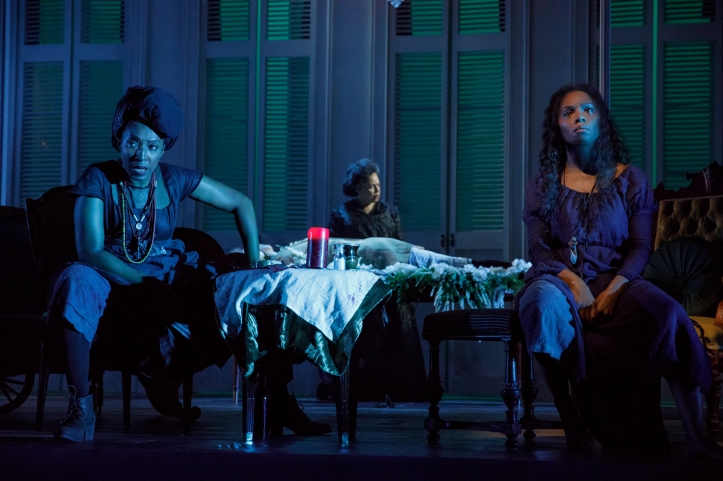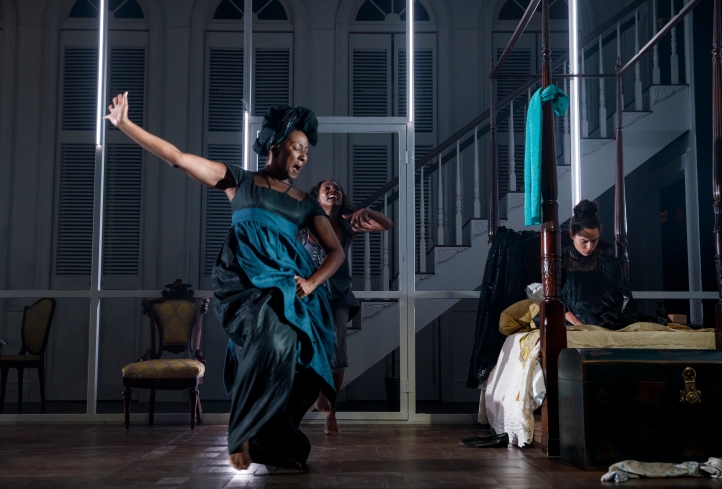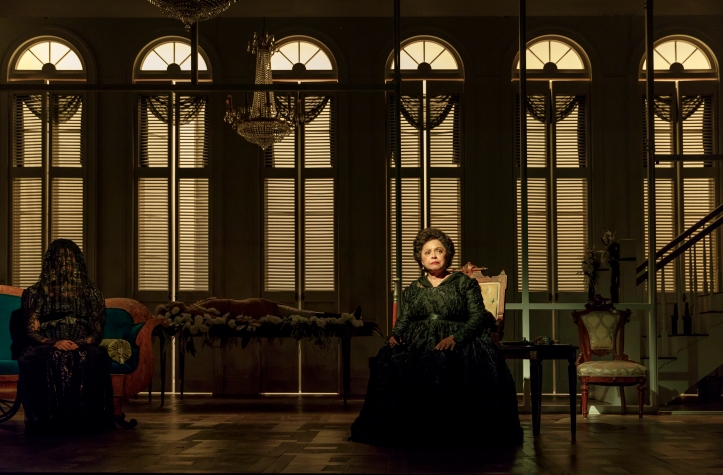
The Review: NYTW’s The House That Will Not Stand
By Ross
In she strolls. Wailing at the top of her lungs to the heavens above. Dressed in magnificent period black, courtesy of some fine work by costume designer Montana Levi Blanco (Public’s Teenage Dick), Madame La Veuve, played with playful aggression by Marie Thomas (off-Broadway’s Having Our Say), grieves for the whole wide world to see. That is until she gets inside. There, in the safety of the grand house, she seems to tire of the dramatics and sits herself down in the Louisiana heat to try to see her way in this new and changing world. It’s a wonderfully fun and mournful opening to Marcus Gardley’s The House That Will Not Stand, a fascinating discourse on freedom structured and inspired by the famous Federico Garcia Lorca’s The House of Bernarda Alba. Lorca described his last play, which many call his best, as a drama about the plight of the Spanish village woman revolving around the themes of repression, passion, and conformity, while taking a deep and close look at the effects of men upon the women that circle around them.
Playwright Gardley (finalist for the 2014 Kennedy Award for the three-part epic: the road weeps, the well runs dry) tackles the same with a witty and sharp pen, centering his adaptation on a grand house, not in Andalusia, Spain, but in Faubourg Tremé, New Orleans in the early 19th Century. Racism and white privilege in the new America is a layer added in this complex telling, with the history of its time period playing a key and dramatic role.

Napoleon has just sold the Louisiana Territory to the United States, throwing the colonial governments and their laws and practices into turmoil. The new arrangement leaves many free women of color and slaves confused about their rights moving forward. In this house, the tension of their future, in all aspects, grips them all tightly, just like those corsets worn by these women on a hot and humid summer’s day. The grande dame of the house, Madame Beartrice Albans, played stoically by the regal Lynda Gravátt (Broadway’s Doubt), tripping over her lines from time to time on that bad leg of hers, are suffocating in the disarray, feeling the world closing in on them and squeezing their very existence and air out of their lungs. The Madame’s decades-long lover, the wealthy white man, Lazar, that has made their fine way of living possible, has died suddenly, choking on a fish bone, they say. He lies spread out on the table in the rear of set designer Adam Rigg’s (MTC’s Actually) spectacular, but slightly convoluted living quarters. Large shutters dominate the muddled structure, with a floor plan that overlaps and intrudes on one another while leaving other expanses underused and empty. But those high windows do cast the voodoo spell of luxurious repression upon our entry, bearing down on them like the history we all see coming.

Their slave girl servant, Makeda, played by the versatile and smart tongued Harriett D. Foy (Broadway’s Amélie), steals the show pretty much, especially with her sweet-toothed opening told with breathless anticipatory fits to the meddling Madame La Veuve. With her good eye glued to Lazar on the night of his tragic death, the story that is coaxed out is hypnotizing, one that sets the stage fully for the desperate acts to follow. Foy’s Makeda is a dynamic storyteller, thinking as much about finding her own pathway to freedom as she does the shiny objects that she collects whenever she can. It’s an intoxicating dynamic she creates blending attachment, care, and personal desire to find her way out of the oppressive heat inside that house.

The social practice of plaçage under which white men and women of color set up common-law households, much like Madame Albans has craftily created, is her place of safety and security, or at least it felt that way before Napoleon sold the Territory and collapsed their world. Beartrice has three children from her now deceased man, all who want to maintain the freedom and privilege that they grew up within, but that lifestyle is now under siege. Times they are a-changing outside of their high ceiling sanctuary, and as directed with a faltering sense of time and place by Lileana Blain-Cruz (LCT’s Pipeline), the three daughters feel the clock ticking on their own existence.
The oldest, Agnés, played with poise and determination by Nedra McClyde (PH’s A Life) has a plan. With the help of her delightful younger sister, Odette who carries the “dark stain” of her family with empowered grace by the lovely Joniece Abbott-Pratt (Broadway’s Eclipsed), Agnés can envision a way out, at least for herself, and it is just waiting outside at the ball. So with pen and paper in hand, and a deceitful disguise in mind, the two go against the warnings of their straight-laced religious sister, Maude Lynn, played a bit too cautiously by the usually solid Juliana Canfield (TFANA’s He Brought Her Heart…). They bind her hands in a completely ridiculous and supposedly religious manner so she won’t get in the way. It’s all a bit clumsy in its visualization and formulation, but the overall outcome rings decidedly true. Mama wants to believe that they all can find refuge against the coming storm by closing the shutters and nesting to escape the war. But the haunting presence of Lazar has other ideas.

Locked up in the attic hearing the mad spirit voices of the past and future, Auntie Marie Josephine, played with wild-eyed abandonment by Michele Wilson (Broadway’s Sweat), heeds Lazar’s warnings in a comical but intense display. Assisted eventually by the divine Makeda and her voodoo sorcery, they are told that they must get out. Lazar speaks, transcending from beyond in one of the most telling and exciting creations by Gardely and Foy, and bringing to the forefront centuries of history and ceremony cascading out of Makeda’s mouth as if from another dimension. But what is out there inside of Lazar’s idea of escape remains to be seen. History doesn’t seem to create much salvation for these women, and his plea is in direct conflict with the demanding Mama. The final battle of wills is set, between Lazar and Beartrice, and each soul within that house will have to decide on which side of the shutters they want to forge ahead into the future.
Just like Lorca’s deliberate exclusion of any male character from the action, Gardley builds on the coming storm with wind and ancestral drums, ratcheting up the sexual tension with devilish glee. The sound design and original music by Justin Ellington (TFANA’s Winter’s Tale) and lighting by Yi Zhao (NYTW’s Red Speedo) do the job well, forcing the hands of time and history to be played out in wild abandonment and desperation. It’s not the most satisfying Lorca adaptation, especially when compared to the outstanding Yerma that graced the Park Avenue Armory stage just recently, but it is a majestic attempt to tease out the tragedy of these women and the history that storms against them. Will the shutters keep out the winds of change? History tells a different tale than the one suggested by Mama.

[…] (naturally) played with upstanding Diva-like bravado by the glorious Lynda Gravátt (NYTW’s The House That Will Not Stand), who profits most spectacularly from the all-to-familiar scenes of ‘death by gunshot’ […]
LikeLike
[…] with a flash for exaggerated humor and solid depth by the dynamic Lileana Blain-Cruz (NYTW’s The House That…, Red Speedo), Fabulation finds its way delicately from affected, balancing stereotypes at every […]
LikeLike
[…] Living Record Collection) and silly fun choreography by Raja Feather Kelly (NYTW’s The House…), rocks the cul-de-sac, but one obstacle remains in the way of a greener tomorrow, a brown thumbed […]
LikeLike
[…] The House That Will Not Stand Written by Marcus Gardley Directed by Lileana Blain-Cruz New York Theatre Workshop Produced by New York Theatre Workshop (James C. Nicola, Artistic Director; Jeremy Blocker, Managing Director) […]
LikeLike
[…] the season, Lewiston/Clarkston got some love, as did The Public’s White Noise, NYTW’s The House That Will Not Stand, Fiddler on the Roof in Yiddish, The Ferryman, Bonnie Milligan in Head Over Heels, Ali Stroker […]
LikeLike
[…] Ross, Carmen Jones Lynda Gravátt and Marie Thomas. The House That Will Not Stand Photo by Joan […]
LikeLike
[…] Ferryman Brandon Uranowitz, Burn This Outstanding Featured Actress in a Play Harriett D. Foy, The House That Will Not Stand Megan Hill, Eddie and Dave Celia Keenan-Bolger, To Kill A Mockingbird Ruth Wilson, King Lear […]
LikeLike
[…] Harriett D. Foy (NYTW’s The House That Will Not Stand) Etta Doris Pat Bowie (Broadway’s The Trip to […]
LikeLike
[…] Lily Dale’s beloved step-father, as well as the always engaging Harriett D. Foy (NYTW’s The House That Will Not Stand) as Clara, the devoted maid, and Pat Bowie (Broadway’s The Trip to Bountiful) as a former […]
LikeLike
[…] of time frame layerings and moments side by side by the detailed Lileana Blain-Cruz (NYTW’s The House that Will Not Stand), this new play about the destructive chaos in one’s head explores the waves of grief that […]
LikeLike
[…] layers sometimes feel as forced as the overly busy uber-symbolic set design by Adam Rigg (NYTW’s The House That Will Not Stand), with solid costuming by Kara Harmon (MTC’s The Niceties), lighting by Jeanette Oi-Suk Yew […]
LikeLike